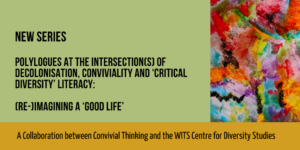The series is edited by Sayan Dey, with support by Kudzaiishe Vanyoro, Aftab Nasir, Lata Narayanaswamy and Julia Schöneberg
The Oxfam Inequality Report is a yearly reminder of the pervasiveness and depth of embedded injustices and inequalities in our daily lives. Colonial trajectories continue to shape contemporary tendencies to universalise the constitutive elements of a ‘good life’, encapsulated in global goals such as the SDGs. The resultant erasure denies other social and political imaginaries, other ways of knowing and understanding the world; as the Zapatista say, ‘a world of many worlds’, wherein we collectively create pluriversal spaces to flourish.

Conviviality provides one frame to collectively live and flourish in mutual respect with human and non-human environments. If we turn the pages of any dictionary, we see that the term ‘conviviality’ means friendliness. This might include ‘being helpful’, ‘being accommodative’, ‘being supportive’ and ‘sharing and caring,’. In a similar way, the term ‘diversity’ also generally refers to practices of de-hierarchization, pluralizing and collective endeavour in producing knowledges. Critical diversity literacy (CDL) provokes us to interrogate dominant methodologies of knowledge production. Taken together, commitments to create and contribute to spaces for diverse and convivial thinking must mean challenging dichotomous, polarised and/or binary representations (e.g., men/women; North/South; rich/poor) and work towards conditions that enable all forms of life on this planet to lead a ‘good life’.
In practice, however, the theoretical ideals of conviviality and diversity are underfed with varied forms of social, cultural, political, racial, gender, economic and other forms of hierarchies turning them into a mere narrative at constant risk of co-optation. The phenomena of accommodativeness, friendliness, and support are dictated by specific frameworks of (neo)colonial power dynamics, which celebrate certain individuals, communities, ideologies, and societies at the cost of dehumanizing others. Such phenomena rarely address the power relations that mark some as disadvantaged and others as privileged. The logic of modernity underpins these divides, securitising borders, grabbing land, extracting natural resources and patronising the ‘other’ with tied aid, undertaken in the name of a monolithic ‘global development’ project. The standardization of these policies, practices and forms of knowledge production has resulted in a myopic view of what it means to BE. The very essence of being and knowing has been reduced to a certain way of living; hence an investigation into the alternatives is not only imperative but also essential to get out of the binaries and build possible futures that may be dormant, but may not yet be impossible.
This radical article series is a collaborative project between the Convivial Thinking Collective and Wits Centre for Critical Diversity Studies. The contributions will be published consecutively over the next few weeks.
The central purpose of this project is to open up alternative, depolarized and plural spaces of knowledge dissemination, publication and dialogue that lie outside formalized institutionalized spaces.
